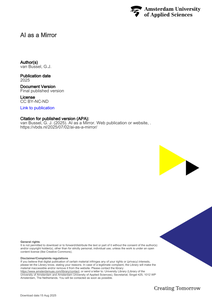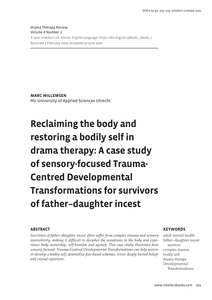This study provides an illustration of a research design complementary to randomized controlled trial to evaluate program effects, namely, participatory peer research (PPR). The PPR described in current study was carried out in a small sample (N = 10) of young adults with mild intellectual disabilities (MID) and severe behavioral problems. During the PPR intervention, control and feedback to individuals is restored by training them to become participant-researchers, who collaborate in a small group of people with MID. Their research is aimed at the problems the young adults perceive and/or specific subjects of their interest. The study was designed as a multiple case study with an experimental and comparison group. Questionnaires and a semistructured interview were administered before and after the PPR project. Results of Reliable Change Index (RCI) analyses showed a decrease in self-serving cognitive distortions in the PPR group, but not in the comparison group. These results indicate that PPR helps to compensate for a lack of adequate feedback and control, and in turn may decrease distorted thinking and thereby possibly later challenging behavior.
DOCUMENT

Book Review of S. Vallor (2024). The AI Mirror. How to Reclaim Our Humanity in an Age of Machine Thinking. Oxford University Press, New York, 263 p.
MULTIFILE

Stage fright among musicians and music students is a severe problem, and a problem moreover that is not easily talked about. This researchreport is a reflection of the project Peak Performance & Reducing Stage Fright, in which six students of the Prince Claus Conservatoire got the opportunity to take the HeartMath training. A training developed by de GGZ Heerenveen. The research, which is described in this report, was aimed at the usefulness of this training for professional music students.
DOCUMENT

A poem about the role screenshots can play in our lives, our minds, our poetry. When does the personal become universal, and when does the digital become lyrical?
MULTIFILE

-
DOCUMENT

Survivors of father–daughter incest often suffer from complex trauma and sensory insensitivity, making it difficult to decipher the sensations in the body and experience body ownership, self-location and agency. This case study illustrates how sensory focused, Trauma-Centred Developmental Transformations can help restore or develop a bodily self, desensitize fear-based schemas, revise deeply buried beliefs and extend repertoire.
DOCUMENT

Tot op heden bestond er geen onderzoeksinstrument dat betrouwbaar differentieert tussen broddelende en stotterende clienten. Een door de eerste auteur ontwikkelde test voor spraakmotorische controle op woordniveau is genormeerd en gevalideerd voor broddelende, stotterende sprekers en controles. Dit unieke instrument heeft een differentiaal diagnostische waarde binnen de vloeiendheidsstoornissen.
DOCUMENT

Online support communities are gaining attention among child-attracted persons (CAPs). Though research has largely focused on the negative consequences these environments create for potential offending, they may also provide a beneficial alternative to more formal treatment settings. To assess the utility for clinical and therapeutic purposes, this analysis focused on subcultural dynamics to examine self-reported wellbeing outcomes of participation in a Dutch forum for CAPs. A total of 15 semi-structured interviews were conducted with moderators, members and mental health professionals involved in the community. Thematic analyses demonstrated that by means of informal social control, bonds of trust and social relational education, the network aims to regulate the behavior and enhance the wellbeing of its marginalized participants. Key outcomes include a decreased sense of loneliness and better coping with stigma, to the point that participants experience less suicidal thoughts. Association with prosocial peers also helps to set moral boundaries regarding behavior towards children, although we cannot fully rule out potential adverse influences. Online support networks offer a stepping stone to professional care that fits individual needs of CAPs, while also providing an informal environment that overcomes limitations of physical therapy and that extents principles of existing prevention and desistance approaches. Gepubliceerd door uitgever Sage: Bekkers, L. M. J., Leukfeldt, E. R., & Holt, T. J. (2024). Online Communities for Child-Attracted Persons as Informal Mental Health Care: Exploring Self-Reported Wellbeing Outcomes. Sexual Abuse, 36(2), 158-184. https://doi.org/10.1177/10790632231154882
DOCUMENT
With this article, I explore the connections between blockchain technology, coloniality, and decolonial practices. Drawing on Sylvia Wynter’s thought on the interdependent systems of colonialism, capitalism, and knowledge, as well as more recent work on the coloniality of digital technologies, I argue that blockchain-based systems reproduce certain dynamics at work in historical colonialism. Additionally, Wynter’s decolonial propositions provide a generative framework to understand countercultural practices with. Inspired by Wynter, Patricia de Vries explores the notion of “plot work as artistic praxis” to ask how artistic work, implicated as it is in capitalist logics, can create space for relating dierently in the context of the exploitations of those dominant logics. I apply this notion to examine how Decentralised Autonomous Organisations (DAOs) in the countercultural blockchain space might contribute to this praxis.
MULTIFILE

In The Age of Total Images, art historian Ana Peraica focuses on the belief that the shape of the planet is two-dimensional which has been reawakened in the late 20th and early 21st centuries, and the ways in which these ‘flat Earth’ conspiracy theories are symptomatic of post-digital image culture. Such theories, proven to be false both in Antiquity and Modernity, but once held to be true in the Medieval Period, have influenced a return to a kind of ‘New Medievalism’.
MULTIFILE
